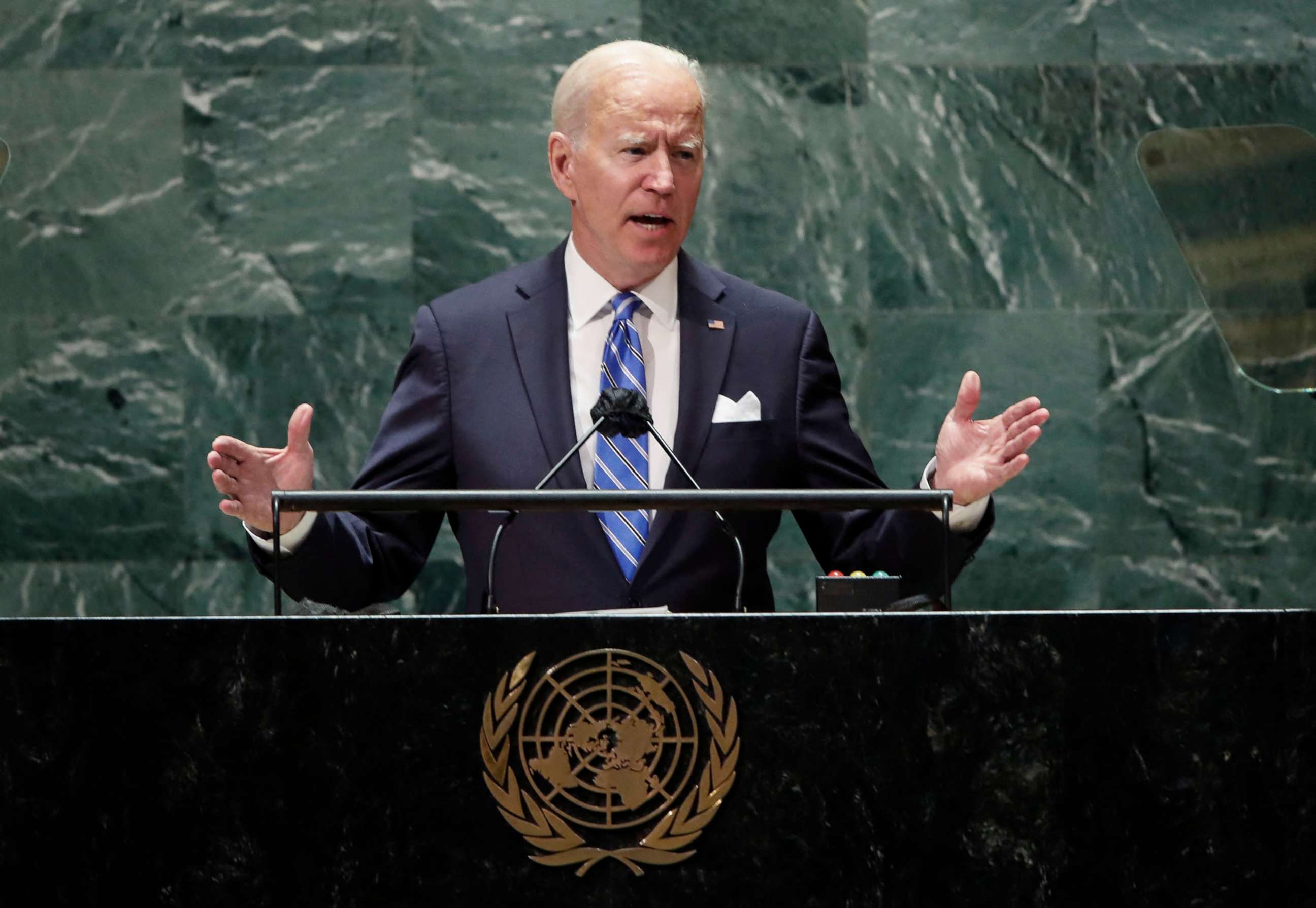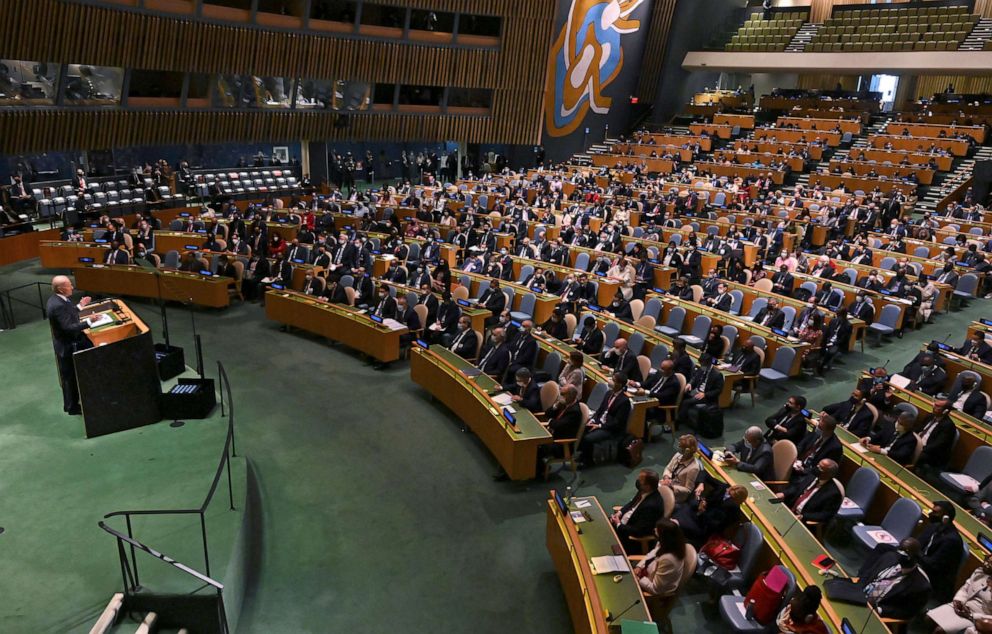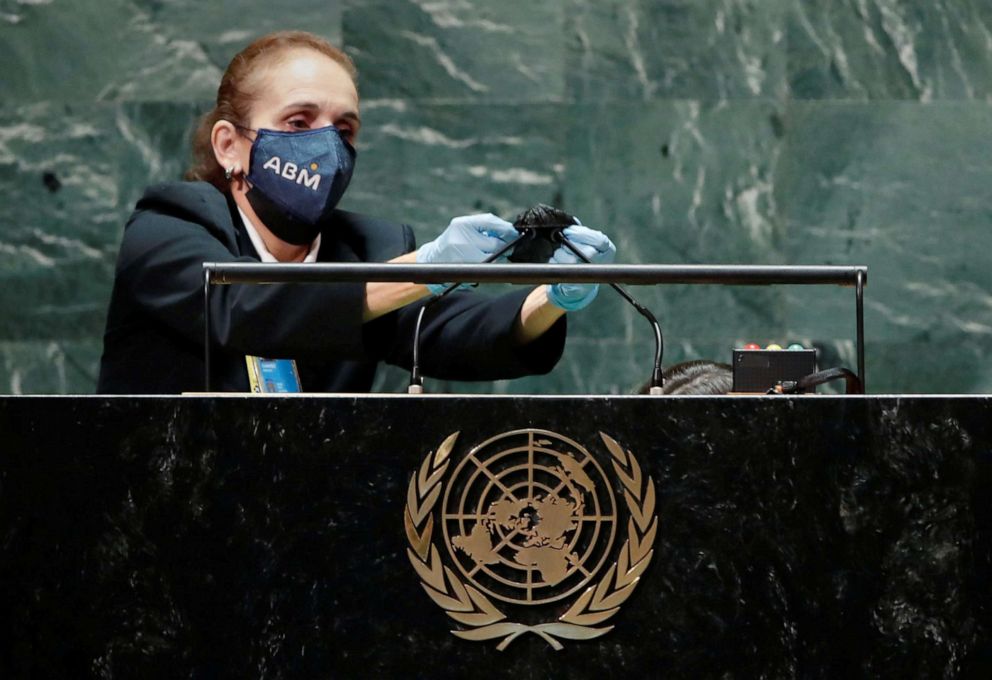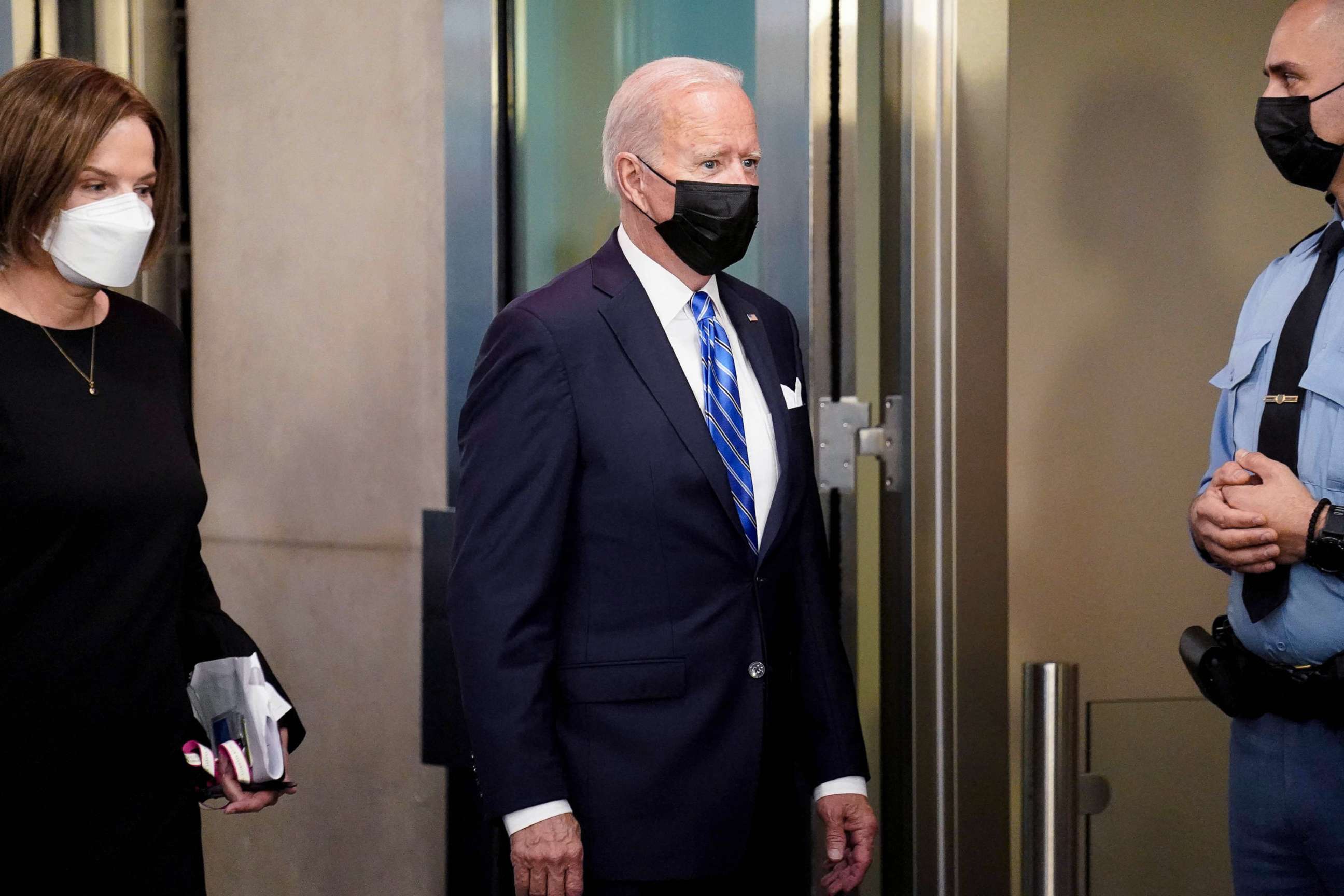Biden challenges UN to act together on pandemic, climate change
He told the General Assembly the world was at "an inflection point in history."
President Joe Biden on Tuesday delivered his first speech as president to the United Nations General Assembly, telling diplomats that they were meeting at a moment "intermingled with great pain and extraordinary possibility."
He pitched his vision for America's return to the world stage -- in sharp contrast with years of bellicosity from his predecessor, President Donald Trump -- in which Biden said the U.S. would helm the response to the coronavirus pandemic and the climate crisis, and put behind decades of conflict in favor of diplomacy and partnership.

The world, he said, stood "at an inflection point in history," saying that, "to fight this pandemic, we need a collective act of science and political will."
"Today, many of our greatest concerns cannot be solved or even addressed through the force of arms," Biden said. "Bombs and bullets cannot defend against COVID-19, or its future variants."
His remarks were a laundry list of his goals -- with some of the strongest words reserved for the climate crisis -- that largely glossed over recent tensions with allies regarding the U.S. pullout from Afghanistan.
"We've ended 20 years of conflict in Afghanistan," Biden said, "and as we close this period of relentless war, we're opening a new era of relentless diplomacy of using the power of our development aid to invest in new ways of lifting people up around the world."
He did not make even a passing reference to a recently announced defense partnership with Australia and the United Kingdom aimed at curbing China's influence on in the Indo-Pacific region, which led Australia to nix a major defense deal with France for nuclear-powered submarine technology. That, in turn, prompted France to recall its ambassador from the U.S. and express its displeasure with Biden.
As he left the United Nations complex, a reporter asked Biden how he planned to repair U.S.-France relations. Walking by, he replied simply, "They're great."
The president then met with Australian Prime Minister Scott Morrison, telling the Australian leader "the United States has no closer and more reliable ally than Australia."
The U.S. has helped revamp the so-called "Quad" dialogue -- its partnership with Australia, India and Japan -- to counter a rising China -- and Biden said that chief among the leaders' focus today was advancing "our vision of a free and open Indo-Pacific" region.
Biden planned to return to then Washington and host British Prime Minister Boris Johnson at the White House late in the afternoon, according to the White House.

Administration officials said Biden was trying to set up a phone call with French President Emmanuel Macron, too.
Biden's Tuesday morning speech kicked off a week of global engagements. The White House said Biden hoped to turn the page from conflict to global cooperation and competition.
As the president implored countries to "work together as never before," he tried to tamp down fears over the United States' increasing competition with China.
The day before, U.N. Secretary-General António Guterres warned the U.S. and China to avoid a new Cold War and urged them to fix their "completely dysfunctional relationship."
On Tuesday, Biden told delegates -- without referencing China by name: "We are not seeking a new Cold War or a world divided into rigid blocks."
He said common action was needed to deal with climate change, a crisis he noted was "borderless."
"Will we meet the threat of challenging climate, the challenging climate we're all feeling, already ravaging every part of our world with extreme weather, or will we suffer the merciless march of ever more of ever-worsening droughts and floods, more intense fires and hurricanes, longer heat waves, and rising seas?" he said.
Biden announced he would work with Congress to try to double international public financing for developing nations to fight climate change.
The end goal, with the support of other donors including private capital, would be $100 billion to help developing nations with climate change, he said.
Meanwhile, the coronavirus pandemic has put a focus on special precautions the United Nations was taking to prevent the large, international General Assembly gathering from helping to spread the virus.
The U.N. agreed to an “enhanced cleaning” of the main podium between leaders’ speeches, "changing out microphone heads, re-routing delegations to different 'green rooms,' and the use of air purifiers," a senior Biden administration official said. Staff could be seen swapping out the microphone head between speeches Tuesday.

Biden’s speech followed remarks from Brazilian Prime Minister Jair Bolsonaro, who has refused to get vaccinated, has consistently downplayed the virus's seriousness and was even fined for not wearing a mask in Brazil.
During his remarks, Biden sought to rally the world together to curb the pandemic, noting the world's "shared grief."
"We've lost so much to this devastating pandemic that continues to claim lives around the world, and impacts so much on our existence," he said. "We're mourning more than 4.5 million people, people of every nation, from every background. Each death is individual heartbreak."
"But our shared grief is a poignant reminder that our collective future will hinge on our ability to recognize our common humanity, and to act together," he added.
On Wednesday, Biden will host a virtual summit on COVID-19 to "rally the world urgently to work towards ending this pandemic as rapidly as possible and building our systems better to be able to handle the next pandemic," the White House has said.

"He believes that it is high time for the world to come together and not just national leaders," a senior adviser said, previewing the summit. "But he's placing a heavy emphasis on international institutions, the private sector, non-governmental organizations, all of the actors who collectively have the capacity to beat COVID-19. And he is going to call for an all-hands-on-deck effort that can end this pandemic much more rapidly than if we allow for things to unfold without the kind of focus sustained energy and effort that is required."
The United States will also have a series of announcements about its own further contributions beyond what we've already contributed to ending the pandemic globally, according to the senior administration official.
On Friday, in addition to the first in-person meeting of the Quad countries -- India, Japan, Australia and the U.S. -- in Washington, Biden planned hold individual meetings with India's Prime Minister Narendra Modi, as well as Prime Minister Yoshihide Suga of Japan.
ABC News' Justin Gomez contributed to this report.




